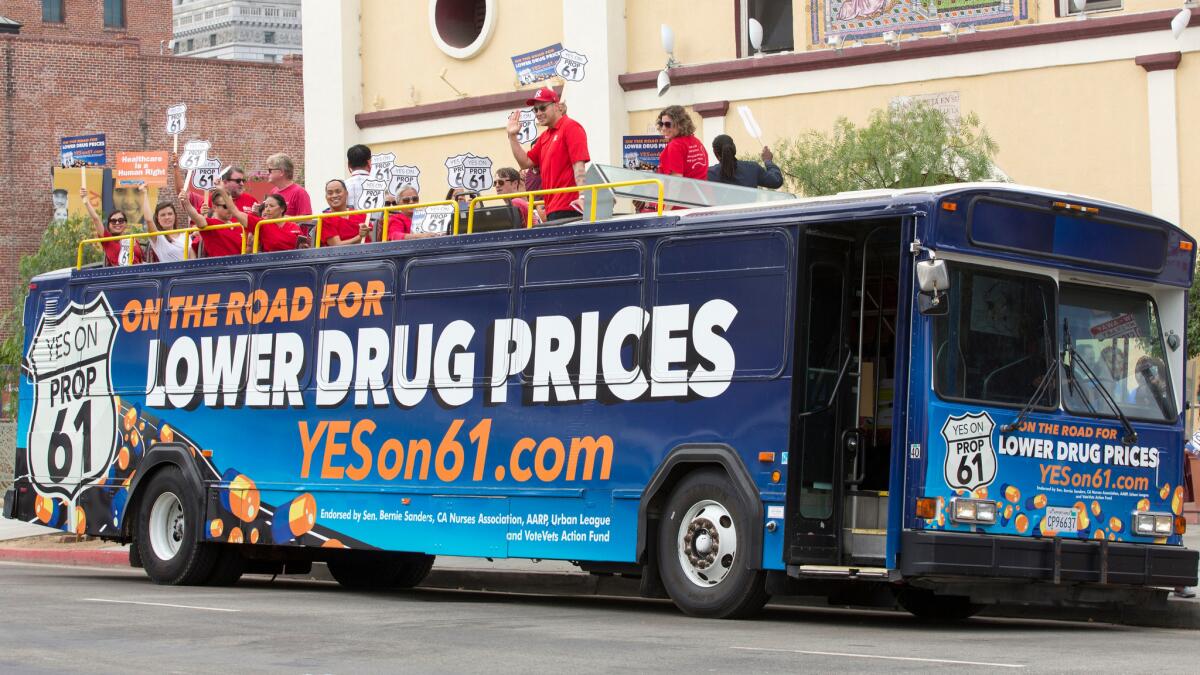Editorial: Proposition 61 is the wrong solution to the problem of high drug prices

- Share via
Blatant price-gouging by EpiPen-maker Mylan and other pharmaceutical companies has stoked public outrage about the high cost of prescription drugs. Meanwhile, the emergence of a new class of exceptionally expensive specialty drugs has caused budget nightmares for state governments. But in California, even modest efforts to require drugmakers to reveal more about how they set their prices have been stymied by lawmakers sympathetic to the industry.
That failure to act is one of the reasons the AIDS Healthcare Foundation, a healthcare provider and advocate for people with HIV and AIDS, pushed Proposition 61 onto the November ballot. The measure would bar most of California’s state-run health programs from paying more for prescription drugs than the U.S. Department of Veterans Affairs does. Proponents say the measure could save taxpayers a bundle because federal law bars the VA from paying more than about 76% of a drug’s average wholesale price.
The underlying problem of fast-rising drug prices needs to be addressed comprehensively and nationally.
As much as Proposition 61’s sponsors rail about drugmakers’ greed, however, they assume that the very same avaricious, monopolistic companies will do nothing in response to the squeeze on the industry’s profits if the measure passes — that somehow, scruples or lack of market power will stop them from compensating by raising the prices they charge private insurers, consumers and the VA itself. That’s either naive or magical thinking, and it’s why Proposition 61 deserves a no vote.
The measure’s price cap would apply to any prescription drugs for which the state was “the ultimate payer,” including medicines purchased for Medi-Cal (the state’s health insurance program for the poor), state employees and retirees, students at public universities, state prison inmates and uninsured Californians with HIV/AIDS. The only exception would be for Medi-Cal’s HMO-style managed care plans, which cover about three-fourths of Medi-Cal’s enrollees. As it happens, the AIDS Healthcare Foundation operates a Medi-Cal managed care plan, which wouldn’t be covered.
How much the proposition would cut the state’s prescription drug spending — which was about $3.8 billion in 2014-15 — is impossible to say. Federal law sets the maximum price the VA may pay for a drug, not the price it actually pays after negotiations with drugmakers, and at least some of those negotiations require that the price remain confidential. So by forbidding the state to pay more than a price it may not be able to discover, the measure may prove impossible to comply with.
Nor does the VA purchase as many different drugs as state programs do. The VA limits the drugs in its formulary as a way to cut costs, while Medi-Cal has to offer every federally approved drug. That means some drugs the state buys wouldn’t be subject to the limits Proposition 61 would impose if it becomes law.
The biggest unknown, though, is what drug makers would do if the measure put a dent in their revenues. If pharmaceutical companies are as profit-hungry as the supporters of Proposition 61 contend — and you’ll hear no argument to the contrary from us — they will seek to recover those lost profits by taking more out of someone else’s hide. After all, that’s what happened after Congress ordered drugmakers in 1990 to extend discounts to Medicaid; according to the General Accounting Office, many pharmaceutical companies responded by raising prices for buyers in the private sector.
Congress upped the ante for the VA in 1992, not only requiring it to pay significantly less than the average wholesale price but also barring drugmakers from raising the VA’s prices faster than overall inflation. Nevertheless, seemingly every major veterans’ organization in California is opposing Proposition 61 on the grounds that drugmakers would stop providing any extra discounts beyond what the federal government requires. Those discounts currently cut the VA’s prices by about 16%.
The underlying problem of fast-rising drug prices needs to be addressed comprehensively and nationally, so that relief for some doesn’t come at the expense of others. It means increasing competition by speeding the approval of new treatments. It means examining the role that federally funded research plays in the development of new drugs, and considering how that investment ought to affect drug patents and pricing. And it means exploring new insurance models that base drug payments on the value each medicine provides a patient.
That’s hard work, and Proposition 61 doesn’t even pretend to do any of it. Voters should reject the measure and demand something better — not for drugmakers’ sake, but for their own.
Follow the Opinion section on Twitter @latimesopinion and Facebook
More to Read
A cure for the common opinion
Get thought-provoking perspectives with our weekly newsletter.
You may occasionally receive promotional content from the Los Angeles Times.










